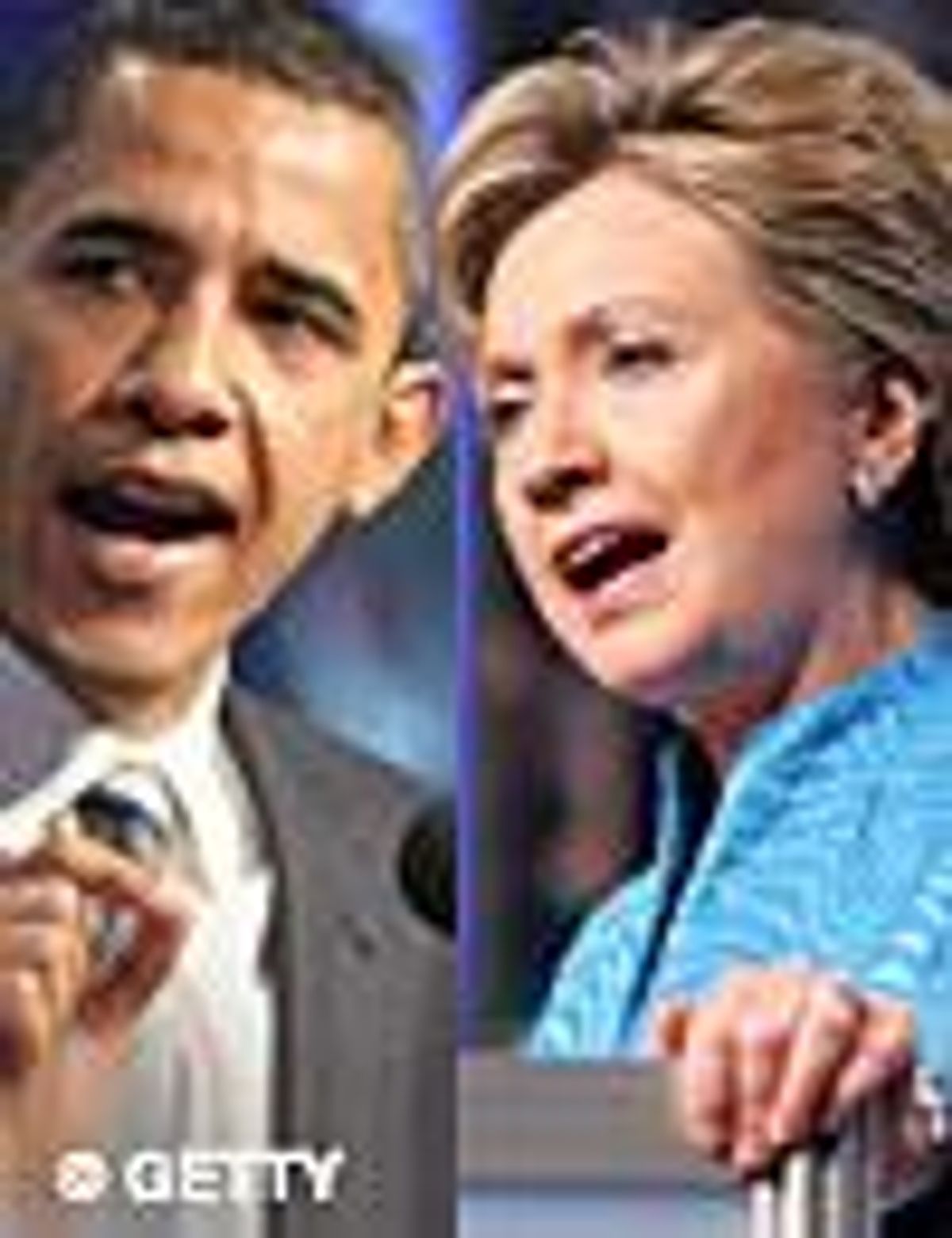Barack Obama
began speaking out more aggressively against his rival
Hillary Rodham Clinton in a heated debate, as the Democratic
presidential race grew increasingly combative ahead of
the pivotal South Carolina primary.
Republican White
House candidates, meanwhile, were focused on Florida,
where former New York City mayor Rudy Giuliani has pinned
hopes for his candidacy after ignoring previous
primaries. His three main rivals split the spoils in
contests that netted three different winners in six states,
leaving the race wide open.
The Democrats'
debate Monday night quickly devolved into an angry
exchange between Clinton and Obama.
Obama told the
former first lady in Monday night's debate that he was
helping unemployed workers on the streets of Chicago when
''you were a corporate lawyer sitting on the board at
Wal-Mart.''
Moments later,
Clinton said that she was fighting against misguided
Republican policies ''when you were practicing law and
representing your contributor ... in his slum landlord
business in inner-city Chicago.''
Obama seemed
particularly irritated at Hillary Clinton's husband, former
president Bill Clinton, whom the Illinois senator accused in
absentia of uttering a series of distortions to aid
his wife's presidential effort.
''I'm here. He's
not,'' she snapped.
''Well, I can't
tell who I'm running against sometimes,'' Obama
countered.
The two rivals,
joined by former North Carolina senator John Edwards,
debated at close quarters five days before the South
Carolina primary -- and 15 days before the equivalent
of a nationwide primary across 22 states that will go
a long way toward settling the battle for the party's
nomination.
Clinton was the
national front-runner for months in the race, but Obama
won the kickoff Iowa caucuses three weeks ago, knocking her
off stride. She recovered quickly, winning the New
Hampshire primary in an upset, and on Saturday, won
the popular vote in the Nevada caucuses while Obama won
one more delegate to the party's presidential nominating
convention than she did.
The Democratic
electorate in South Carolina is expected to be roughly 50%
black, an evident advantage for Obama in a historic race
that matches a black man against a woman. Polls showed
Obama ahead in the race, and he needs the momentum a
win would provide.
Even in the
superheated atmosphere of the primary, the statements and
exchanges between Clinton and Obama were unusually
acrimonious.
Obama suggested
the Clintons were both practicing the kind of political
tactics that had alienated voters.
''There was a set
of assertions made by Senator Clinton as well as her
husband that are not factually accurate,'' Obama said. ''I
think that part of what people are looking for right
now is someone who is going to solve problems and not
resort to the same typical politics that we've seen in
Washington.''
Clinton
countered: ''I believe your record and what you say should
matter.''
Edwards, who
badly trails his two rivals, tried to stay above the fray
while pleading for equal time.
''Are there three
people in this debate, not two?'' he asked.
''We have got to
understand, this is not about us personally. It's about
what we are trying to do for this country,'' Edwards said to
applause from the audience.
With the holiday
honoring the slain civil rights leader the Reverend
Martin Luther King Jr. as a backdrop, the candidates also
addressed questions of racial equality in the debate
sponsored by the Congressional Black Caucus Institute
and CNN.
Edwards tried to
make a distinction by pointing out that Clinton and
Obama supported a trade deal with Peru. ''South Carolina has
been devastated by NAFTA and trade deals,'' Edwards
said.
Obama responded
by criticizing Edwards for voting for permanent trade
relations with China and struck out at Clinton for saying
last year that the North American Free Trade Agreement
with Mexico and Canada has been a boon to the economy.
''I think it's been devastating,'' Obama said.
Hillary Clinton
was scheduled to leave South Carolina after the debate
and not return until Thursday -- an indication that she is
putting more stock in the February 5 contests. Her
husband and daughter, Chelsea, are expected to
campaign for her in South Carolina.
Edwards, who
acknowledged that he got his ''butt kicked'' in Nevada, has
also staked his fading hopes on South Carolina, the state
where he was born and whose primary he won in 2004.
The Republicans
focused on the January 29 contest in Florida, where the
race is close despite Arizona senator John McCain's
victories in South Carolina and New Hampshire. A
Florida win would give the victor a whopping 57
delegates to the party's national convention and a huge jolt
of energy in the run-up to February 5.
McCain courted
the influential Cuban vote in Miami, stressing that he
would not lift the United States' decades-old Cuba
embargo and noting that some U.S. prisoners of war in
Vietnam, though not him, were tortured by Castro's
agents.
The veteran
senator hopes his personal and professional links to
Florida, as well as his military background, will help
him break out of the pack in a state that is home to a
large number of veterans and active-duty service
members.
Almost
immediately after the Republicans' January 19 South Carolina
primary, Giuliani and Mitt Romney, a Mormon millionaire and
former Massachusetts governor, wasted no time in
criticizing McCain. Their swipes were couched in
economic terms, in line with Americans' recession
worries that are dominating the race.
Giuliani attacked
McCain for siding with Democrats in voting against
President George W. Bush's tax cuts in 2001 and 2003.
Romney, buoyed by wins in Nevada, Michigan, and
Wyoming, portrayed the Arizona senator as a consummate
Washington insider.
Romney on Monday
said that both McCain and Giuliani would ''have a
relatively difficult time'' strengthening an economy that is
in danger of falling into a recession and that only he
has the business experience to turn the economy
around. (AP)


















































































Viral post saying Republicans 'have two daddies now' has MAGA hot and bothered